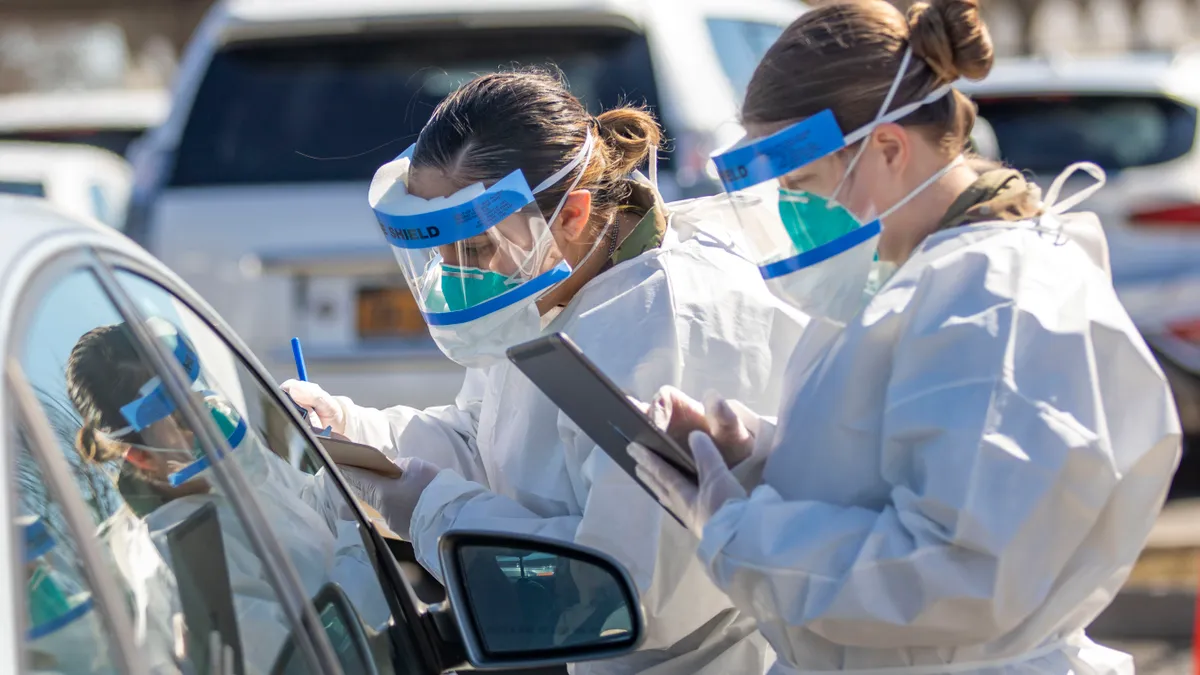Dive Brief:
-
The National Institutes of Health has awarded $129.3 million in contracts to support efforts to increase the country's COVID-19 testing capacity as part of the Rapid Acceleration of Diagnostics (RADx) initiative.
-
NIH said nine companies will use the latest funding to scale up production of point-of-care tests, increase laboratory capacity and advance new methods of testing.
- The funding for lab-based diagnostics is going to sites that collectively aim to scale up to handle 454,000 tests a day. The initiative aims to expand the nation's testing capacity by December so that 2% of the population (6 million people) can be tested per day.
Dive Insight:
Faced with national demand for COVID-19 testing estimated to be millions more tests per day above current levels, NIH has structured the $500 million RADx initiative as a "Shark Tank"-style competition to provide near-term awards for increasing test capacity as U.S. schools and universities restart in-person classes this fall.
In late July, the agency made initial awards to seven companies to support a range of new lab-based and point-of-care tests. Most of the recipients of the latest round of NIH funding are labs with plans to increase their COVID-19 testing capacity.
Sonic Healthcare, which was named as the recipient of government funding last month, is aiming to bring its daily testing capacity up to 166,000 samples using a $6.3 million contract. That makes Sonic the recipient with the highest daily testing target.
The Broad Institute is using its funding to try to quadruple its daily testing capacity to 100,000. Other companies are aiming to grow capacity faster still. Working with government funding disclosed last month, Aegis Sciences, which has already quadrupled capacity, is adding equipment from Beckman Coulter and Thermo Fisher to achieve another four-fold increase to hit 60,000 tests a day.
PathGroup has similar aspirations. Today, the Tennessee-based lab service provider uses Roche 6800 and Hologic Panther instruments to handle 10,000 tests a day. PathGroup plans to grow that figure to 80,000 by December with the support of Illumina, LGC and Thermo Fisher Scientific.
Illumina, a provider of sequencing and array technologies, is another recipient of funding. The NIH support comes months after Illumina became the first company to receive FDA emergency use authorization for a sequencing-based COVID-19 test. Illumina could expand to handle 48,000 tests a day.
The lab-based portion of the funding also features a $2.6 million contract for Ceres Nanosciences, the developer of a particle technology designed to enable the capture of low abundance analytes. Ceres will use the NIH support to apply its particle technology to COVID-19 sample preparation in an attempt to achieve up to 10-fold improvements in speed and performance.
The rest of the NIH funding went to developers of point-of-care tests. MicroGEM, through its MicroLab unit, received one of the larger contracts, securing $16.6 million to support work on a portable PCR device that detects SARS-CoV-2 in saliva samples at the point of care in 15 minutes. NIH also awarded money to MatMaCorp to fund development of a portable PCR testing platform.
The other point-of-care testing company to receive NIH money, Maxim Biomedical, is developing a kit with functionality similar to the new antigen tests from Abbott and Roche. All three companies are touting products they contend can deliver COVID-19 diagnoses in 15 minutes using immunoassays that do not require instruments to generate results.










